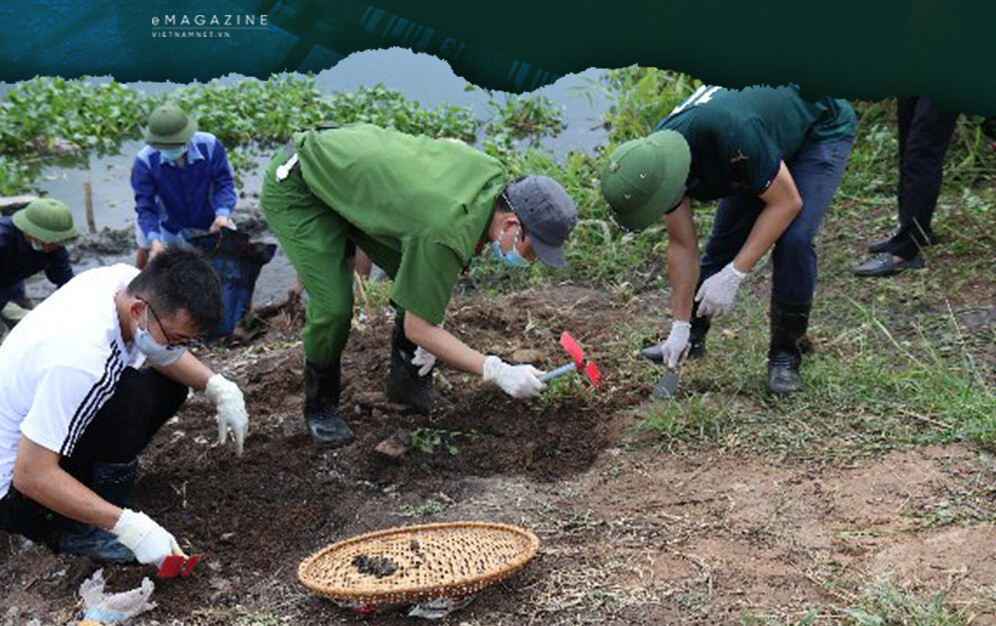
Twenty-seven years ago, Lieutenant Colonel Le Viet Viet, head of the Traditional Examination Department under the Ministry of Public Security’s National Institute of Criminal Sciences, graduated from university with a bachelor’s degree in biology. After that, he obtained a master’s degree with a thesis about human genes.
When visiting an acquaintance, he saw materials about human DNA and found it very interesting. The chance meeting changed the life of Viet, who initially wanted to become a teacher of biology.
He decided to apply at the Center for Biological Assessment of the Institute of Forensic Sciences, and later worked there for 13 years.
In 2018, Viet, who was then deputy director of the center, was appointed to the head of the Scene Examination Division, and in early 2024, took office as head of the traditional examination department.
“Scene examination is a job that requires comprehensive scientific knowledge. Therefore, our department has experts in different fields, including mechanical examiners, bullet examiners, and biological and chemical examiners. When necessary, we have to ask for support from experts of other departments," Viet said.
The purpose of scene examination is detecting, collecting and preserving traces at the scenes. Detection can be done by the eye, by equipment, chemicals and light sources, and by critical thinking.
Asked about his working schedule, Viet said: “Once you work in the armed forces, and take this specific job, you won’t have the so-called weekend. You have to work in the morning, afternoon and at night,” Viet said. “All of us have two mobile phones which are always in ‘on’ mode, and we have to go out any time when we are requested."
“If we come to the sites late, traces may disappear,” he explained.
Viet started his career with a tragic case in 2005-2006, when he was at the biological inspection center.
“The killer and victim were lovers. When a conflict arose, the perpetrator murdered his lover and dismembered her body. When investigators picked her body up, it had decomposed,” he recalled.
“We brought the samples into lab for analysis. The odor from the dead body existed in the lab for a month, though we had equipment to suck the air out,” he said.
In many cases, scene examiners and forensic doctors had to pick up each piece of the decomposing broken skull to reassemble it and find information about the victims.
Some young officers in the division vomit as soon as they arrive at sites. Even veteran officers can also be shocked because of barbaric crimes.
However, the officers have to stifle their emotions and concentrate on examining, and have to come as close as possible to dead bodies and traces to find out the truth.
“Of course, I never talk about the experiences at home,” Viet said, adding that he only tells his children about the achievements of science and technology in his job.
In fact, examining scenes is not the only thing the officers have to do. They have to do another important work – calming victims’ relatives and acquaintances down.
“We are human too. Our eyes are filled with tears when we hear their heart-wrenching cries,” he said.
Over the last 18 years of working as a scene examiner, Viet several times witnessed strange phenomena in labs, which would have led to a misunderstanding if examiners had not had deep knowledge.
Viet related a rare case which happened in his career. A boy was declared a biological child of a man, but genetic testing showed that it was not true.
“The wife affirmed that she had relations only with her husband in her life, and if she could not prove her innocence, she would commit suicide,” Viet said.
After many efforts and analyses, Viet and co-workers came to the conclusion that this was a "chimera" case, i.e., a person who has cells from two different sources. Since those cells are from different organisms, it results in two sets of DNA.
Scene examination is implemented to detect traces left by criminals. As criminals tend to use sophisticated actions, officers like Viet have to keep learning and update their knowledge to fulfill their tasks.
Nguyen Thao